In the dappled shade of ancient Thrace, where whispers of gods and mortals intertwine, young Orpheus first laid his fingers upon the lyre. It was not merely an instrument, but a gift of destiny, a companion that would echo his soul’s deepest cries across realms. With each strum, a melody surged forth, so pure and poignant that the very birds hushed their songs to listen. Orpheus, with his lyre, became a symbol of the world’s harmony and dissonance, his life a tapestry woven with threads of passion, sorrow, and unyielding hope. His tale transcends the confines of mythology, reflecting the quintessential human odyssey towards love, the agony of loss, and the relentless quest for that which lies just beyond reach. Orpheus’s legend, etched in the annals of time, resonates with the enduring truth of our own journeys.
| Origin | Greek Mythology |
|---|---|
| Classification | Hero/Musician |
| Family Members | Oeagrus (Father), Calliope (Mother), Eurydice (Wife) |
| Region | Thrace, Greece |
| Associated with | Music, Lyre, Influence over Nature and the Underworld, Tragic Love Story |
1. The Lineage and Birth of Orpheus
The Divine Bloodline
Orpheus emerged from the womb of Calliope, the muse of epic poetry, his life already entwined with the artistry of the divine. Rumor whispered of Apollo, the god of music and truth, as his father, bestowing upon Orpheus a heritage rich with celestial promise. This lineage was not just a genealogical fact but a prophetic canvas, painting expectations of greatness upon his mortal life. His very existence was a confluence of divine talent and mortal struggle, a duality that predestined him to touch the sublime with his melodies and to feel the earthly pangs of sorrow with acute sharpness.
Birth and Early Years
Amidst the verdant valleys of Thrace, a land celebrated for its artistic heritage, the muses’ whispers and the harmonious chords of nature cradled Orpheus during his infancy. Ancient texts speak of his early years as a period of awakening, where every sound from the rustling leaves to the flowing rivers seemed to nourish his innate talent. His mother, along with Apollo, tutored Orpheus, teaching his fingers to measure the weight of each note and wield the power of song, thus preparing him for a life celebrated in song across ages and civilizations.
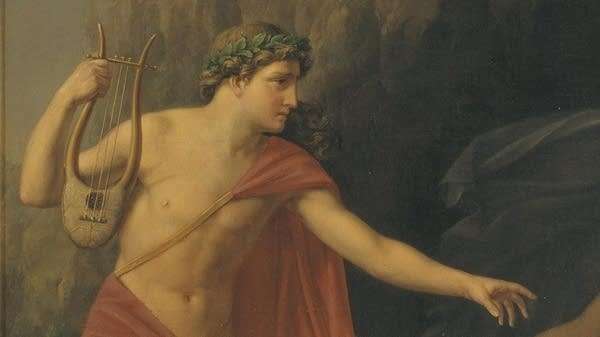
2. The Power of Orpheus’s Music
The Gift of the Lyre
The instrument of Orpheus’s legend, the lyre, was said to be a celestial gift, possibly bestowed by Apollo himself, the archetypal maestro of music. This divine intervention was not merely the passing of an object but the transference of a cosmic baton. According to the mythic narratives, Apollo recognized Orpheus’s potential and offered the lyre to guide him towards unfathomed musical heights. The lyre, thus, was not just an instrument; it was the key to unlock the harmony of the world, a tool that would allow Orpheus to weave his personal destiny with the threads of the divine.
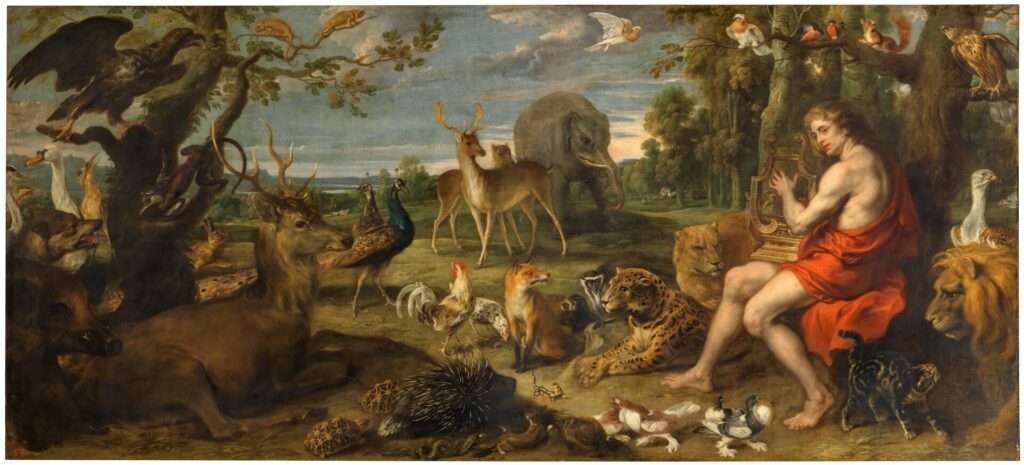
Mastery and Influence
Orpheus’s mastery over the lyre was unparalleled, and the chronicles of his influence are inscribed in both poetry and stone. His music had the potency to sedate the roiling rivers, to coax the birds from the skies into a silent reverie, and to charm the most ferocious of beasts into submission. There are accounts, like those found in Ovid’s “Metamorphoses,” where even the inanimate stones were not immune to his melodies, moving of their own volition to form walls and amphitheaters, eager to enclose the enchanting sounds within their embrace. Such narratives not only highlight the enchanting effect of his music but also metaphorically suggest the power of art to transform and unify the natural world.
3. The Love of Orpheus and Eurydice
The Fateful Meeting
In the verdant meadows of Thrace, where flowers danced to the rhythm of gentle breezes, Orpheus’s eyes met Eurydice’s, and in that gaze, a bond as eternal as the stars was formed. Their love was instant and profound, a connection that transcended the mere confluence of two souls. Orpheus, with the lyre in hand, played melodies so tender and true that even the gods paused to listen, witnessing a love so pure that it seemed to sanctify the air around them. Eurydice, moved by the depth of his devotion, joined her life to his, and together they dreamt of a future as harmonious as the symphonies that serenaded their union.
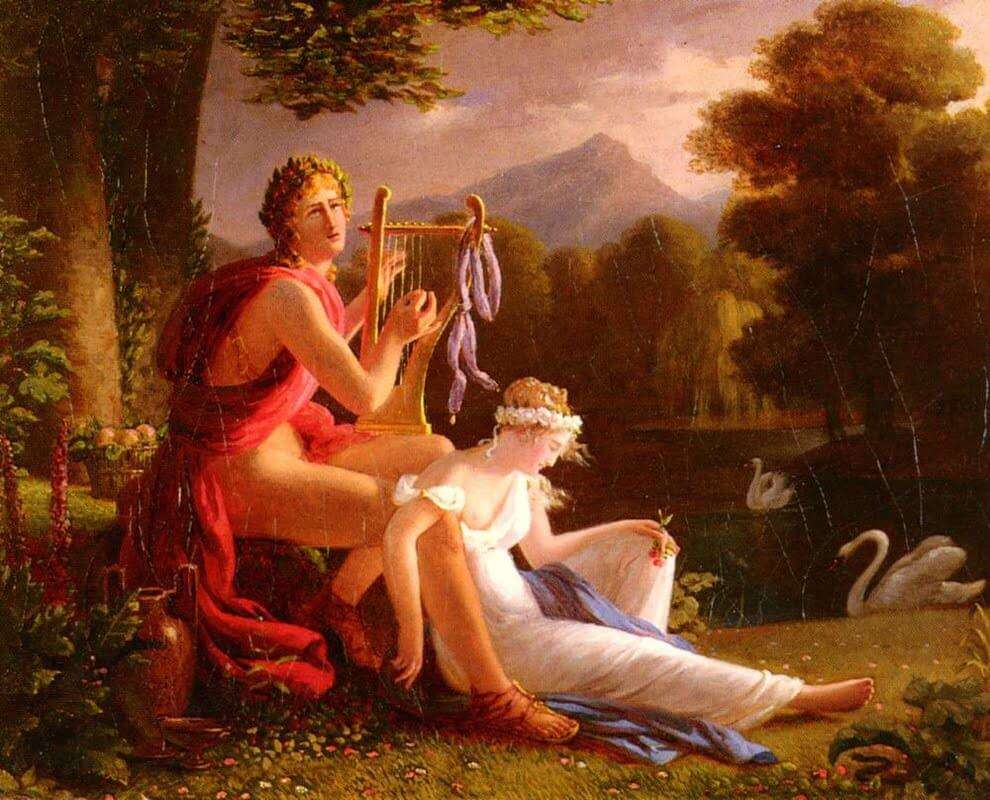
Tragedy and Descent to the Underworld
But fate, as ever, wove threads of both light and shadow into the tapestry of life. Eurydice, pursued by a would-be suitor, met her untimely end when a viper’s venom claimed her life. Stricken by grief, Orpheus’s lament rose above the mortal realm, and his resolve to reclaim his beloved from the clutches of death led him to the very gates of the Underworld. Ancient texts, like those of Virgil’s “Georgics,” recount his descent into Hades, armed with nothing but the lyre and the strength of his love. There, before the rulers of the dead, Orpheus played a song so melancholic and beautiful that it softened the hearts of Persephone and Hades, convincing them to permit Eurydice’s return to the land of the living, under one grave condition.
4. The Ultimate Test and Loss
The Challenge of Hades
In the dim caverns of the Underworld, where no mortal dared to tread, Hades set forth a challenge—a test of faith that would dictate Orpheus’s destiny. As he strummed the strings of his lyre, weaving a sorrow that tugged at the very essence of the gods, Hades was moved but cautious. He decreed that Eurydice could follow Orpheus back to the realm of the living, but under one harrowing stipulation: Orpheus must not look back until both had reached the light of the surface. This condition was a trial not of the body but of the spirit, an odyssey where trust alone would be his guide.
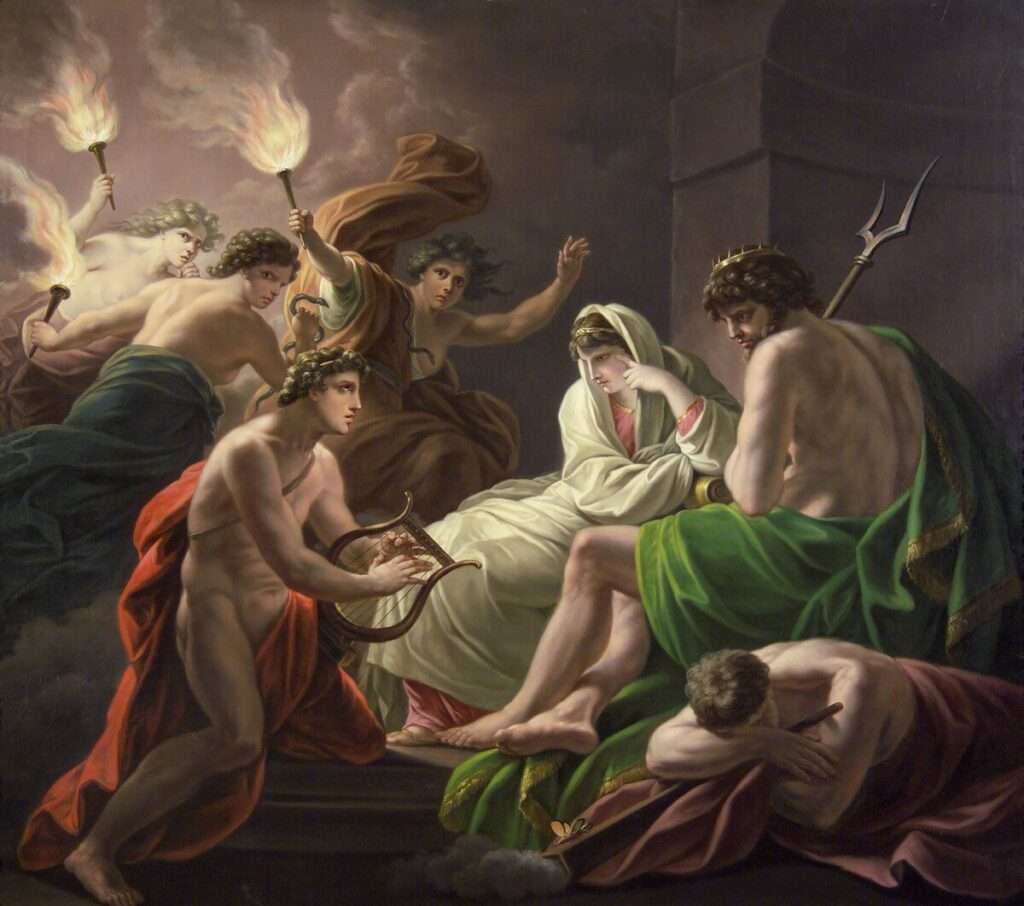
The Fateful Glance
The journey back was a silent march, a passage where every instinct urged Orpheus to confirm Eurydice’s presence with a glance. As they neared the threshold of the living world, a single moment of human doubt overcame Orpheus. The fateful glance back was cast, and Eurydice, with outstretched hands, was pulled back into the abyss, lost to Orpheus forever. This moment was not merely the culmination of a tragic love story but a poignant reflection on the human condition—the fragile dance between doubt and faith, and the profound loss that ensues when fear overshadows trust.
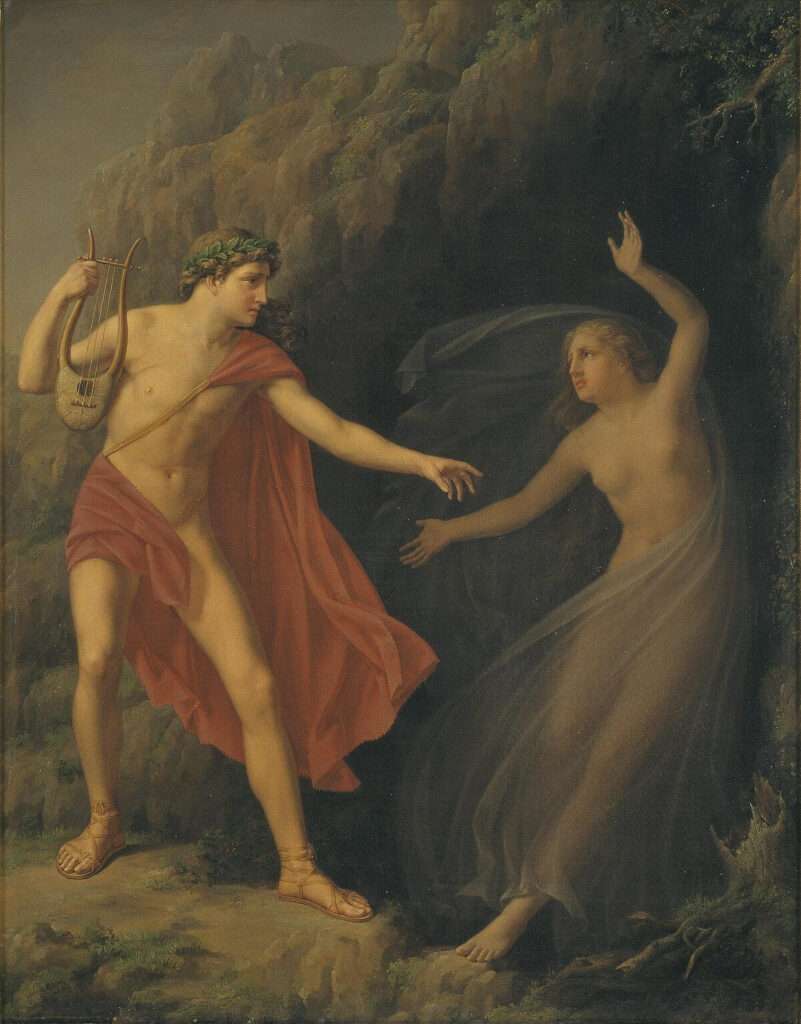
5. Orpheus’s Legacy and Cultural Impact
The Hero’s End
The twilight of Orpheus’s mortal journey was marked by a heart still heavy with grief. He met his end at the hands of those who could not comprehend the depth of his sorrow or the truth of his songs. As legend has it, even after his death, the Muses mourned, and the creatures of the earth wept for the silent lyre and the voice that had once made rivers standstill. Orpheus’s head and lyre, carried to the island of Lesbos by the tides of the sea, continued to utter prophecies. His lyre was placed amongst the stars as a constellation, a reminder in the heavens of the power of music and the impermanence of life.
Influence Across Cultures
Orpheus’s myth has echoed through the corridors of time, influencing a myriad of cultural expressions. His story has been a muse to poets, a rhythm to composers, and a canvas to artists. From the operas of Monteverdi and Gluck to the poems of Rilke, the figure of Orpheus is a symbol of the artist’s journey and the transformative power of love and loss.
Countless artworks have depicted his descent and attempted return from the Underworld, immortalizing his quest as an eternal testament to the human spirit. Moreover, his legacy has permeated various aspects of modern culture, inspiring movements in film, theatre, and even psychology, with the term “Orphic” becoming synonymous with enchanting music and profound, otherworldly insights.
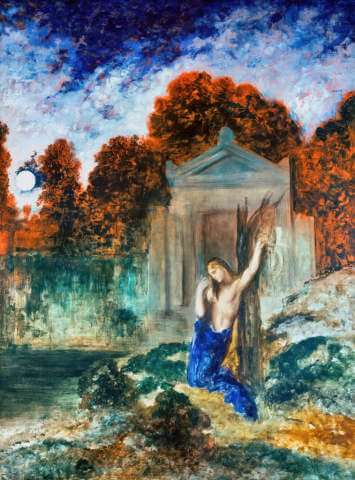
6. Conclusion
Orpheus embodies the soul’s deep capacity for love, the transformative essence of art, and the human confrontation with nature’s unyielding forces. His myth, interweaving the celestial with human vulnerability, resonates with the power of love and the pain of loss. Echoing from his legendary lyre to his fateful descent, Orpheus’s narrative transcends time, informing modern culture and psyche. His enduring tale attests to our ability to reach for the divine through creativity, confront destiny, and pursue hope amidst adversity. Orpheus’s journey, steeped in love and sorrow, remains a timeless reflection of the truths at the core of human experience.
